RICHARD’S “CANADA AM” REVIEWS FOR JANUARY 30 WITH BEVERLY THOMSON.
 Richard’s “Canada AM” reviews for “Project Almanac,” “Wild Card” and “Black or White.”
Richard’s “Canada AM” reviews for “Project Almanac,” “Wild Card” and “Black or White.”
Watch the whole thing HERE!
 Richard’s “Canada AM” reviews for “Project Almanac,” “Wild Card” and “Black or White.”
Richard’s “Canada AM” reviews for “Project Almanac,” “Wild Card” and “Black or White.”
Watch the whole thing HERE!
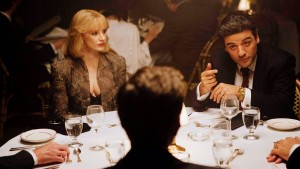 Don’t let the title fool you. “A Most Violent Year” doesn’t have fight scenes, much gunfire or even a Steven Seagal cameo. The violence implied in the title refers to the time. Set in 1981 New York, statistically one of the most brutal years in the city’s history, it’s really the story of a man trying to sidestep violence and grab the American Dream by the tail.
Don’t let the title fool you. “A Most Violent Year” doesn’t have fight scenes, much gunfire or even a Steven Seagal cameo. The violence implied in the title refers to the time. Set in 1981 New York, statistically one of the most brutal years in the city’s history, it’s really the story of a man trying to sidestep violence and grab the American Dream by the tail.
Oscar Isaac is Abel Morales, a young man in an old and dangerous game—the oil business. His distribution business is successful and about to expand, but there are problems. An aggressive city attorney (David Oyelowo) is sniffing around his finances while someone—a business rival perhaps—is systematically hijacking his trucks. Each time a truck loaded with oil disappears it erodes his bottom line and puts his dream of a waterfront distribution depot further out of reach. At home the violence and corruption of the times seeps into his personal life as his wife Anna (Jessica Chastain) the daughter of a Brooklyn gangster, gets restless.
Director J.C. Chandor is unafraid to take his time telling this story. Some will find his deliberately paced film a bore, others a slow burn. He concentrates on the characters, not the situations, putting Abel’s honesty and entrepreneurial spirit front and center. Much time is given to overcoming setbacks through sheer strength of will. His iron resolve is the character’s cornerstone, and much dialogue is devoted to it, but Isaac’s nicely delivered, understated performance keeps it from becoming repetitive.
The fireworks (such that they are) come later when Abel is at the end of his rope. Chastain (in a far more interesting performance than her work in “Interstellar”) on one side, corruption and violence on the other, the film pushes Abel, building to a satisfying climax. Still, Chandor doesn’t allow “A Most Violent Year” to live up to its name. A truck chase is pulse racing and a sub-plot about driver traumatized by a hijacking adds a hint of character-driven action, but the real tension comes from the fraught atmosphere Chandor creates with ruthless efficiency behind the camera and the restrained performances in front of it.
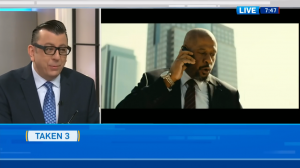 “Canada AM” film critic Richard Crouse reviews “Selma” and “Taken 3.”
“Canada AM” film critic Richard Crouse reviews “Selma” and “Taken 3.”
Watch the whole thing HERE!
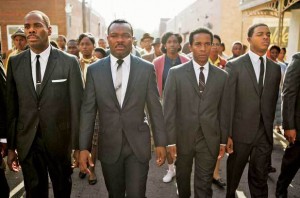 By Richard Crouse – Metro In Focus
By Richard Crouse – Metro In Focus
“I like to think of myself as a good actor,” says David Oyelowo, “but Martin Luther King, I ain’t.”
The 38-year-old British actor plays the venerated civil rights leader in Selma, a dramatic retelling of Dr. King’s 1965 Selma to Montgomery voting rights march.
It’s a stirring performance that has already earned him a Golden Globe nomination as Best Actor in a Drama. He admits he wasn’t a natural fit for the part— “I would never have cast me in this role, a British actor, having not done much work in Hollywood.”—but the film’s producer Oprah Winfrey (who also has a heart-wrenching cameo) said, “I can see King in you.”
The actor, best known for his work on the British TV show MI-5, told an audience at the AFI he always felt like he’d play King at some point. “Very soon after my wife and I moved to this country, I was told from above that I would play this role on the 24th of July, 2007. I couldn’t believe it, so I wrote it down.”
With the help of his higher power, Oprah, director Ava DuVernay, research and a weight gain of thirty pounds—eat lasagna late at night he says—Oyelowo found the character and won the blessing of Bernice King, Dr. King’s daughter. “It was huge for me to bridge that gap between the production and the family,” OIyelowo told The Daily Beast.
Martin Luther King III, son of Martin and Coretta Scott King, called Selma, “a very emotional experience,” and hopes that the film’s success will spur Hollywood interest in his father’s life, work and legacy.
Steven Spielberg is reportedly working on a biopic and a new German film called Schwarzkopf BRD features King in a study of racial politics in Berlin.
In more traditional films Dr. King has been portrayed by everyone from Paul Winfield, who earned an Emmy nomination for his performance in King, a three hour TV miniseries, to Jeffrey Wright in Boycott, to son Dexter King in The Rosa Parks Story.
King siblings, Dexter and Yolanda, collaborated with filmmakers Rob Smiley and Vincenzo Trippetti on the most unique retelling of their father’s life. Combining animation and historical footage, Our Friend, Martin is a time travel story about a student sent back in time to meet King at significant moments in his life. The hour long film is difficult to find but features wonderful vocal performances from Angela Bassett, LeVar Burton, Danny Glover, Oprah Winfrey, Whoopi Goldberg and Dexter King as his father at age 34.
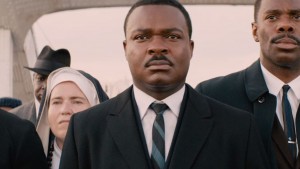 “Selma” is a snapshot of a time. Instead of trying to cover the width and breadth of Martin Luther King’s life and accomplishments, director Ava DuVernay hones the story down to one seminal event, Dr. King Jr.’s march from Selma to Montgomery, Alabama. It’s an effective and uncluttered approach that brings one of the biggest events of the civil rights movement into sharp focus.
“Selma” is a snapshot of a time. Instead of trying to cover the width and breadth of Martin Luther King’s life and accomplishments, director Ava DuVernay hones the story down to one seminal event, Dr. King Jr.’s march from Selma to Montgomery, Alabama. It’s an effective and uncluttered approach that brings one of the biggest events of the civil rights movement into sharp focus.
The heart and soul of the film is Annie Lee Cooper (Oprah Winfrey), a Selma nurse who tries to register for the vote. The legal right is hers, but this is 1965 and a racist county clerk asks her a series of questions to make sure she is qualified to vote. After she recites the Preamble to the U.S. Constitution he asks her how many county judges are in the area. “Sixty-seven,” she replies confidently. “Name them,” he says, stamping Denied on her application.
Cooper is not a main character. She pops up now and again, but the power of this scene informs the rest of the movie. She is an average woman who stood up for herself and neighbors, and with the help of Martin Luther King Jr. (David Oyelowo) and a dedicated group of civil rights workers broke down barriers in a state where the governor (Tim Roth) is firmly in favor of segregation.
“Selma” is a powerful movie not just because of what it does show but because of what it doesn’t show. There is no “I Have a Dream” speech or Bus Boycotts to be seen. Instead the script focuses on the salient details of the Selma marches which leaves time to humanize and get under the skin of the Dr. King and several of the other characters.
The movie is helmed by a gobsmackingly good performance from Oyelowo as King. He’s righteous, fiery and but plays King like a man, not an emblem. It is career making work but he’s not alone in handing in powerful work.
Winfrey’s big scene is a showstopper, a quietly played moment of frustration, hurt and anger, all of which flash across her face in a nicely underplayed role. For me, however, the movie’s most effective scene happens between King and an elderly man, Cager Lee (Henry G. Sanders), who has lost his son in a burst of race related violence. The men meet in the morgue and say what you might expect people in that situation to say to one another, but the look of Sanders’s face, in the presence of the civil rights leader, is heartbreaking and hopeful simultaneously.
“Selma” is a historical document, but so alive and timely, it is essential viewing almost fifty years after King’s assassination.
 Richard reviews “Woman in Black 2: Angel of Death” and “A Most Violent Year” with “Canada AM” host Marci Ien.
Richard reviews “Woman in Black 2: Angel of Death” and “A Most Violent Year” with “Canada AM” host Marci Ien.
Watch the whole thing HERE!
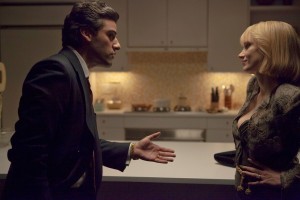 Don’t let the title fool you. “A Most Violent Year” doesn’t have fight scenes, much gunfire or even a Steven Seagal cameo. The violence implied in the title refers to the time. Set in 1981 New York, statistically one of the most brutal years in the city’s history, it’s really the story of a man trying to sidestep violence and grab the American Dream by the tail.
Don’t let the title fool you. “A Most Violent Year” doesn’t have fight scenes, much gunfire or even a Steven Seagal cameo. The violence implied in the title refers to the time. Set in 1981 New York, statistically one of the most brutal years in the city’s history, it’s really the story of a man trying to sidestep violence and grab the American Dream by the tail.
Oscar Isaac is Abel Morales, a young man in an old and dangerous game—the oil business. His distribution business is successful and about to expand, but there are problems. An aggressive city attorney (David Oyelowo) is sniffing around his finances while someone—a business rival perhaps—is systematically hijacking his trucks. Each time a truck loaded with oil disappears it erodes his bottom line and puts his dream of a waterfront distribution depot further out of reach. At home the violence and corruption of the times seeps into his personal life as his wife Anna (Jessica Chastain) the daughter of a Brooklyn gangster, gets restless.
Director J.C. Chandor is unafraid to take his time telling this story. Some will find his deliberately paced film a bore, others a slow burn. He concentrates on the characters, not the situations, putting Abel’s honesty and entrepreneurial spirit front and center. Much time is given to overcoming setbacks through sheer strength of will. His iron resolve is the character’s cornerstone, and much dialogue is devoted to it, but Isaac’s nicely delivered, understated performance keeps it from becoming repetitive.
The fireworks (such that they are) come later when Abel is at the end of his rope. Chastain (in a far more interesting performance than her work in “Interstellar”) on one side, corruption and violence on the other, the film pushes Abel, building to a satisfying climax. Still, Chandor doesn’t allow “A Most Violent Year” to live up to its name. A truck chase is pulse racing and a sub-plot about driver traumatized by a hijacking adds a hint of character-driven action, but the real tension comes from the fraught atmosphere Chandor creates with ruthless efficiency behind the camera and the restrained performances in front of it.
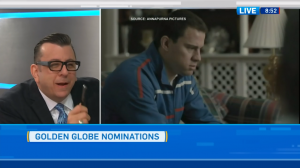 “Canada AM”: Richard and host on the Golden Globes nominations 2015
“Canada AM”: Richard and host on the Golden Globes nominations 2015
Watch the whole thing HERE!
MOTION PICTURES
Best Drama
Best Comedy
Best Director
Best Actress in a Drama
Best Actor in a Drama
Best Actor in a Musical or Comedy
Best Actress in a Musical or Comedy
Best Supporting Actress
Best Supporting Actor
Best Screenplay
Best Foreign Language Film
Best Animated Feature
Best Original Song
Best Score
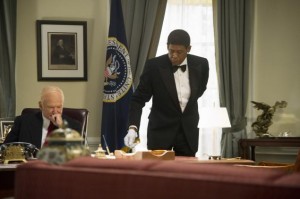 “You hear nothing. You see nothing. You only serve.”
“You hear nothing. You see nothing. You only serve.”
Those are the words of advice given to former planation worker Cecil Gaines (Forest Whitaker), on his first day as a butler at the White House. For the next three decades he was a witness to history, serving eight presidents from Truman to Reagan, during the stormiest days of America’s history.
His job is to be invisible and leave ideology at home—“We have no tolerance for politics at the White House,” he’s told—but in his subsequent years of service he became a quietly potent force within the halls of power, touching the hearts of the Kennedy’s and fighting for wage equality for African-American workers in the nation’s Executive Mansion.
Very loosely based on the life of Eugene Allen, the movie is an intergenerational story of big moments from a time filled with big moments.
The overall timeline will be familiar to anyone who’s ever watched the History Channel, but “The Butler” recounts the turbulent times through one man’s deeply divided family, bringing the story home with simple, first person storytelling.
Gaines sees nothing and hears nothing at work, but his son Louis (David Oyelowo) is a socially engaged student, who first becomes involved with the Freedom Riders and later with the Black Panthers. Father and son don’t see eye-to-eye despite mother Gloria’s (Oprah Winfrey) best efforts to unite them.
At the center of “the Butler” are two remarkable performances that temper the film’s tendency to veer into melodrama.
Forest Whitaker is a dignified presence throughout in a quiet performance that allows the character’s inner life to shine through. It’s all about the details. The way he strokes the tie Jackie Kennedy gave him after JFK’s assassination. The pained looked in his eye as he kicks his son out of the White House. They are small moments that cut through the movie’s sweeping story, keeping the whole thing grounded.
As Louis English actor David Oyelowo plays every scene with intensity, but never goes over the edge. His Louis is a committed man, a thinker who deeply believes in the Civil Rights movement, but refuses to blindly accept dogma.
Much of the casting of the presidents—Robin Williams as President Dwight D. Eisenhower, James Marsden as President John F. Kennedy, Liev Schreiber as President Lyndon B. Johnson, John Cusack as President Richard Nixon and Alan Rickman as President Ronald Reagan—feels like stunt casting, but the story isn’t their to tell. Director Lee “Precious” Daniels wisely keeps the focus on Gaines and family to tell the tale.
“Lee Daniels’ The Butler” (the name was changed from “The Butler” when Warner Bros. sued, claiming they already owned the name) is a handsome movie, the kind that gets the attention of the Academy, which serves as a poignant reminder of the difficult and rocky road so many walked in the search of racial equality.